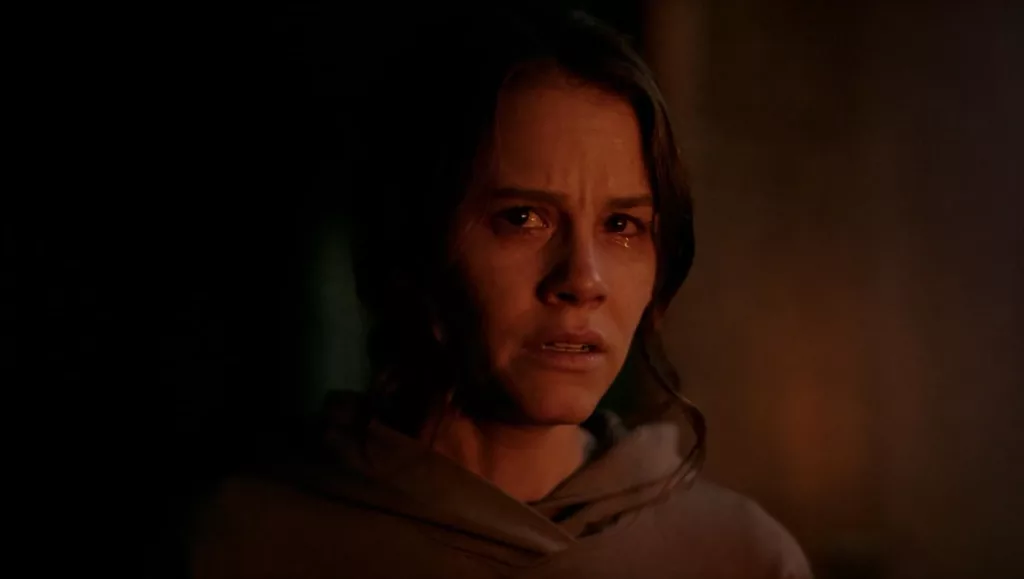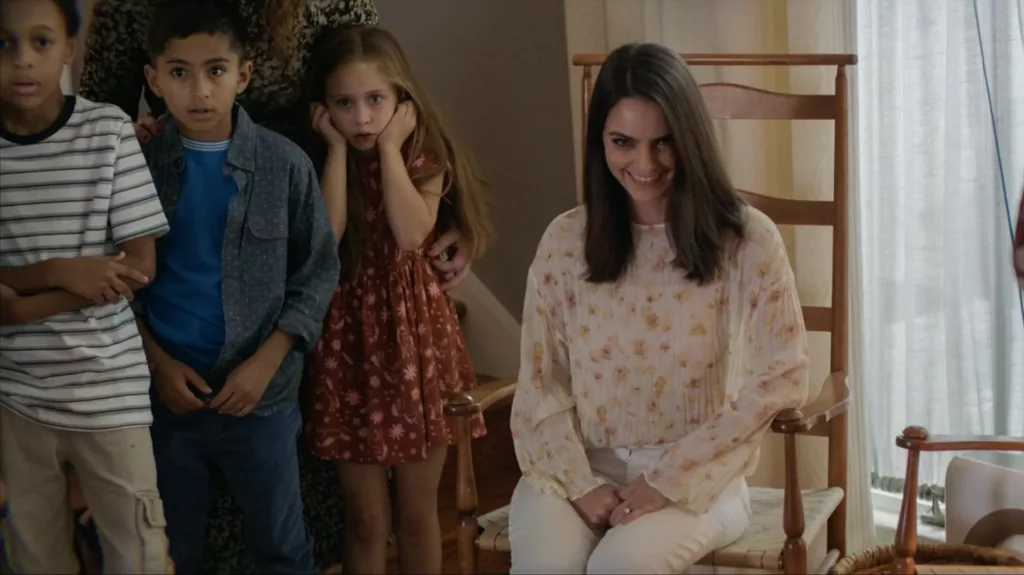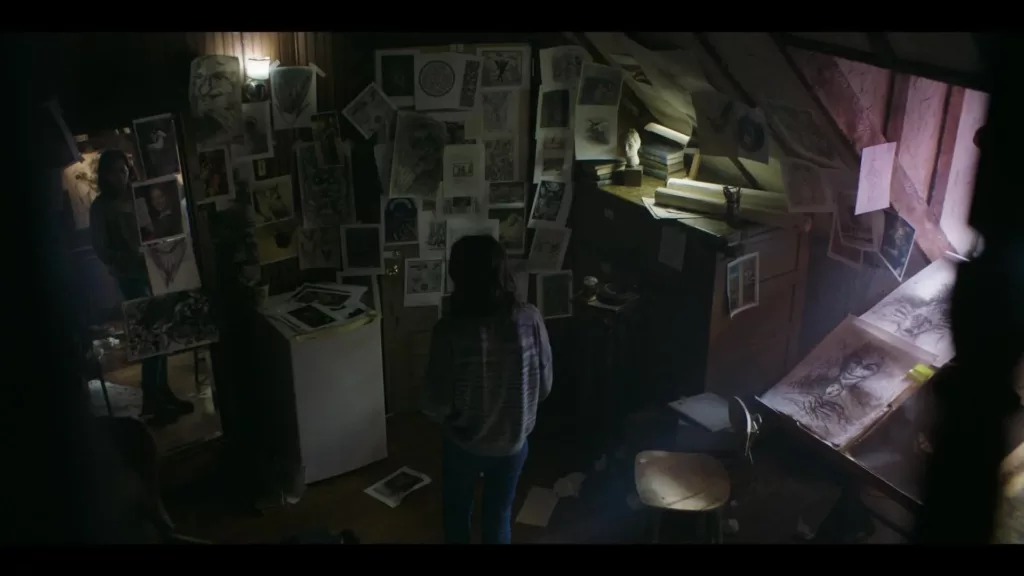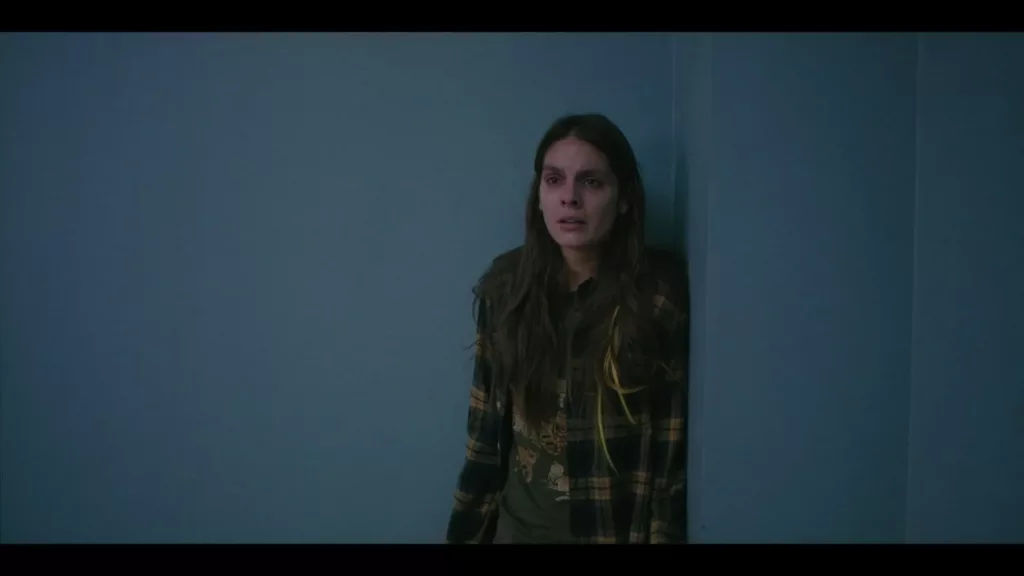Right from the start, Smile lays bare the roots of its protagonist’s turmoil. We meet Rose Cotter as a young girl, thrust into a haunting scene of her mother’s lifeless form amidst a messy tableau of pills, cigarettes, and empty bottles. Already, the seeds of trauma have been sown, and their bitter fruit is soon to bloom.
Flash forward, and Rose is now a psychiatrist trying to help others in the ER where she works. But a disturbing new case pulls her back into the shadows of her past. When a patient kills herself before Rose’s eyes, wearing a nightmarish rictus grin, it seems a ghost from the girlhood scene has come crawling out.
From there, Rose finds herself plagued by visions of that grin as it spreads from face to face. Are these visitations just traumatic memories manifesting, or something more sinister stalking Rose through the waking world? Writer-director Parker Finn sets us firmly between these realms of psychology and supernatural mystery.
Bacon brings nuance to Rose’s steady unraveling, even as Finn builds an unsettling tone through his command of visuals. Smile proves an unflinching debut, unafraid to probe dark places as it winds its tale of grief, stigma, and the debts of the past. So from its macabre first moments, we are drawn deep into the labyrinth of Rose’s mind and the nightmares inhering there.
Faces in the dark
The film wastes little time pulling us deep into Rose’s turmoil. We meet her as a dedicated psychiatrist, but she is still haunted by childhood trauma. When a new patient dies by suicide before her, screams etched into a nightmarish smile drag Rose back down the rabbit hole.
Strange visions soon assail her: glimpses of grinning figures in the shadows. Maybe they’re manifestations of past demons resurfacing or something more sinister following in the dead woman’s wake. As Rose scrambles for answers, those around her give less and less credence to her fears. Only her detective ex, Joel, believes something unknown is amiss.
Together, they go chasing leads down a murky path. Security footage of other grim “incidents” holds clues, if unsettling ones. Conversations with a traumatized survivor raise more questions than answers. Through it all, Rose’s mental state grows increasingly distressed, with real terrors mingling with memories in her mind.
Supporting characters get their moments too, from Rose’s caring but concerned fiancé to her self-absorbed sister. And what of Rose’s maternal history repeating, as her probing therapist seems more intrigued by her responses than solutions? Through it all, the film skillfully plays on ambiguous planes—where do the normal end and the unnatural begin? In the shadows, something grins ever closer to the truth.
The Dark Visions of Smile
From the start, Smile aims to unsettle its viewers through visuals. Long shadows and strange angles create a sense of lurking threat just out of sight. And Finn proves skilled at twisting everyday images into unnerving tableaus.
A stain on a mattress becomes the seed of Rose’s trauma. Later, flickering lights twist her modern home into a maze of dread. Whether framed up close or at a distance, cinematographer Charlie Sarroff ensures every scene leaves an impression.
Much credit also goes to composer Cristobal Tapia de Veer. His score burbles with atonal unease, hitting frantic crescendos at perfect moments. Individual notes hang pregnant in the air, ratcheting up tension before the plunge.
Through it all, Finn proves to be a master of suspense. He holds scenes just long enough for discomfort to blossom, then bursts them with a grimace or shattered glass. Jump scares come too, but it’s the gradual scenes of creeping eeriness that linger with the viewer.
Moreover, Finn conveys Smile’s scariest sequences through implication, not gore. A suicide occurs just off-screen, more unsettling for what we don’t see. Though darkness grips the tale, these techniques keep Smile a disturbing watch, not an endurance test.
In the end, it’s this melding of technical craft that gives Smile its power to unsettle long after leaving the theater. Even if answers never come, the feelings will linger in murky corridors of the mind.
Burden of Proof
This film lives or dies on Sosie Bacon’s shoulders. Thankfully, she carries the weight with ease. From beginning to end, her performance is a stunner.
We feel Rose’s exhaustion in every slumped movement, her fear etched on each sleepless face. As others doubt her, we see only a woman terrified of her own mind. Bacon makes us believe without question.
Her scenes of distress are particularly haunting. Yelling at loved ones, apologizing in dejection—no moment feels anything less than raw. Through this, we live in Rose’s head, sharing her terror.
Supporting players do fine jobs bringing surrounding characters to life. Kyle Gallner brings charm as cop Joel, giving Rose an ear when needed. And Robin Weigert is chilling as always, imbuing therapist Dr. Northcott with subtleties, leaving her motives masked.
Still, this remains Bacon’s show. She plunges with courage into the bleakest of spaces and emerges transformed. Even in a film as disturbing as this, hers is a performance that sticks long after the creeping credits roll. With roots in reality yet touching horror, hers is a turn both deeply unsettling and impossible to forget.
Beyond the Surface
On its face, Smile presents a familiar terror of unseen forces haunting its main character. But delve deeper, and you’ll find it grappling with weightier themes.
Rose’s demons arise from inherited trauma, the legacy of her mother’s struggles. The film suggests such affliction can lie dormant, only to bloom anew when triggered by later upset. In facing her own fears, Rose also confronts the stigma that defined her upbringing.
It’s in this realm that Smile proves most thought-provoking. The entity, transmitted through witnessed tragedy, acts as Rose’s manifested doubts. Are her experiences truly supernatural or just trauma resurfacing? Her loved ones’ skepticism mirrors the dismissal faced by many with mental afflictions.
Even Rose’s own therapist prioritizes eliciting feelings over solutions. It’s a subtle indictment of an imperfect system and the lack of empathy for those navigating internal terrains that few truly see. Throughout, Smile questions whether we can ever fully know another’s private torments.
Rose’s journey could be taken as a plea for acceptance—that the mind’s frailties deserve care, not casual scorn or isolation. By the film’s end, no simple answers arise. But in grappling with such complex issues beneath the surface scares, Smile leaves room for reflection long after the final credits fade.
Peaks and valleys
At its heights, Smile proves genuinely unsettling. From its moody visuals to Sosie Bacon’s raw performance, Finn creates a prime atmosphere for scares. Twisted angles and looming shadows kept me on edge from start to finish.
But weaknesses emerge too. Chiefly, an over-reliance on cheap jump scares wears thin. When every creak means a shriek, it dilutes the tension crafted elsewhere. Critics also note plot points borrowed from genre classics, lacking freshness.
The film likewise falters in its conclusion. After building a compelling central mystery, resolutions feel rote and arrive too easily. A stronger ending could have tied its psychological threads together with more impact.
Additionally, Smile merely hints at deeper dives into themes of stigma and inherited trauma, never fully exploring their complexity. With time, perhaps Finn will refine his storytelling to match the technical prowess shown here.
In the end, Smile offers a solid, if flawed, genre piece. Capably unsettling and boasting strong leading work, it makes for a disturbing watch. But patterns followed too closely, and a lackluster payoff kept it from the peaks of originality glimpsed at times. With experience, Finn shows promise to evolve beyond mere frightening into truer insights. For a debut, it lays solid foundations—now to raise higher still.
Lingering Nightmares
With a smile, Parker Finn announces his arrival with a feature that, despite flaws, will linger uneasily in your mind. As a debut, it shows already well-honed skills with visuals and tone, even if reliance on tropes makes it less than fresh.
Still, beyond cheap scares, Smile hints at promising avenues its creator may yet explore. Threads of stigma, inheritance, and the inability to shed old trauma warrant deeper inspection. In Rose’s story and our own unease afterwards, perhaps lies a chance for discourse.
Ultimately, Finn’s first foray grants a disturbing watch, painting nightmares you’ll feel long after exiting the theater. But glimpses lurk of greater sophistication to come, of plumbing deeper anxieties and wielding craft to uncover fresh insight rather than merely frighten. With a smile, one senses this director has only started to hone a vision with the power to burrow and resonate.
The Review
Smile
In summary, Smile shows flashes of atmospheric chills and psychological depth but relies too heavily on familiar tropes to reach its full potential. Director Parker Finn proves himself a capable visual stylist and opens doors to meaningful themes, even if he doesn't walk through them. Carried by Sosie Bacon's unraveling performance, it makes for a haunting, tension-filled watch, but one hoping for true surprises may find themselves disappointed.
PROS
- Atmospheric and unsettling tone
- Tension-filled score and soundtrack
- convincing lead performance by Sosie Bacon
- Exploration of themes like mental health stigma
CONS
- Over-reliance on formulaic plot beats and jump scares
- Lacks originality compared to inspirations like It Follows
- The conclusion feels unearned and arrives too predictably
- Fails to fully develop interesting themes






















































Discussion about this post